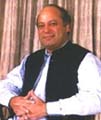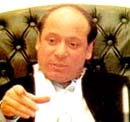
Commentary/Fuzail Jafferey
Miyan Saheb is no Sharif

The reported renaming of the North West Frontier Province (NWFP) as Pakhtunkhawa by the two-and-a-half-month-old Nawaz Sharif government might have surprised or even shocked most of the countries in the region including India, but not those who have been closely watching Sharif's various moves ever since President Farooq Ahmad Khan Leghari dissolved the National and provincial assemblies
and announced the new election schedule on Nov. 5, 1996.
Those Pakistani journalists and political analysts who had described
Miyan Saheb as a 'status-quo' politician before the Feb 3 elections
must now be scratching their heads as to where and how they went
wrong.
Nawaz Sharif is determined to be worldly-wise, practical and pragmatic to the core. His sole aim is to consolidate his position and power even if it means sacrificing the larger interests of the nation.
The latest move on the NWFP should also be seen and judged from
this very point of view.
The election manifesto released by the Pakistan Muslim League
on Dec 31, 1996 promised, besides many other things, that ''every
citizen will enjoy equal rights free from fear and ignorance and
will be provided basic facilities including health, education,
justice and sense of security''.
He is yet to take any initiative in the direction of achieving
these high-sounding objectives. Instead, Miyan Saheb has conveniently
changed his priorities and political strategies. Why? Nawaz Sharif
knows it too well that the so-called two-third majority his party
secured in the National Assembly is not as real and meaningful
as it appears to be on paper. He also knows that he is in no way
a true representative of the masses.
The Pakistani masses have been so much disgusted with their unprincipled and self-serving politicians that the majority of eligible voters did not exercise their franchise in the elections held on Feb. 3, 1997.
According to former Australian prime minister and Commonwealth Observer group chairman Malcolm Fraser not more than
22 to 27 per cent voters participated in the general election,
making the position of the new government quite vulnerable in spite
of the PML's "spectacular" success.
Nawaz Sharif won the elections hands down not because of the virtues
of the Muslim League -- the party which was responsible for the
partition of the country, but by default.
Of the two main opponents of Miyan Nawaz Sharif, Benazir Bhutto
who had all along championed the cause of democracy and had bravely
fought against the despotic regime of General Zia-ul-Haq, miserably
failed to handle the affairs of the country during her second
innings as the prime minister.
She neither bothered to fulfil the promises she had made at the
time of election nor her government took any steps to avert the
economic and financial crisis which continued to brew at a faster
pace than ever before.
Human rights were ruthlessly trampled upon resulting in the mass
killings of the Urdu-speaking Mohajirs at the hands of the Karachi
police and Rangers. The situation reached its climax with the
murder of Mir Murtuza Bhutto, the only surviving brother of Benazir
while she was still the chief executive of the country.
Besides, her husband Asif Zardari who was initially known as Mr
10 per cent, achieved the dubious status of Mr 50 per cent in a couple of years. He is also alleged to be directly involved in the murder of Murtuza Bhutto. Since then Zardari has been languishing
in the Landhi jail of Karachi.
Over and above all this, Benazir's autocratic style of functioning
turned her one-time loyalists like President Leghari into bitter
foes. Miyan Nawaz Sharif, who extended his unserved support to
President Farooq Ahmad Leghari as well as to Murtuza's widow,
Ghinva Bhutto, finally emerged as the only beneficiary of the
situation.
On the other hand, super test-star Imran Khan who had announced
the formation of his Tahrik-e-Insaf (party for justice) with a
big bang, finally came to the ground with a thud. Leave apart his
other party colleagues, Imran himself could not win even one of
the seven seats he contested in the February elections.
This writer humbly begs to differ with senior Indian journalists
such as V T Joshi and others who attribute Imran's humiliating
defeat to his playboy image and his French-Jewish connections.
It was the other way round. The voters belonging to younger generations who would have loved to vote for the "Great Khan" got frightened by his pronouncements about his concept of "Ghairatmund Musalman" (proud Muslims), revival of tribal courts and sending the corrupt politicians to the gallows once he won the elections.
The voters finally decided to dump him fearing that he might turn
into another Zia-ul-Haq after assuming power. The way was thus
paved for Nawaz Sharif to be the new tenant of the prime ministerial
palace in Islamabad.
As we know, even before the elections could be held, President
Farooq Ahmad Khan Leghari constituted the Council for Defence
and National Security (CDNS) which included the three Army chiefs.
While the President was to be the chairman of this high-power
committee, the prime minister was co-opted an ordinary member.
Remember, that Nawaz Sharif was the first politician to support
and congratulate Leghari on the formation of the CDNS.
At that time, he had, of course not even dreamt of getting two-third
majority in the National Assembly. After having achieved the "impossible", it became possible for Miyan Saheb to cut the President to size.
Gen Zia, during his 10-year regime, had incorporated as many
as 25 amendments into the country's Constitution in order to appropriate absolute power for himself. The notorious eighth amendment empowered the President to dismiss an elected government without assigning any reason.
The first victim of this amendment was Benazir Bhutto when her
government was dismissed and the National Assembly dissolved by
President Ghulam Ishaq Khan on August 6, 1990. In the general
elections held in October 1990, the Islamic Jamhoori Ittehad (IJI)
won the majority and Nawaz Sharif was elected as the prime minister.
Within less then three years, Nawaz Sharif and Ghulam Ishaq Khan
found themselves attacking each other. Consequently, the President
dismissed the IJI government on April 18, 1993 along with the
dissolution of the National Assembly. What happened to Benazir
Bhutto on November 5, 1996 is recent history.
In the above context, Nawaz Sharif has done the right thing by
ignoring the agony of Leghari and getting the 13th amendment passed
in parliament. This has taken away the discretionary powers
of the President and governors to dissolve the National and provincial
assemblies without seeking the advice of the prime minister and
the chief minister. Sharif has taken a right step towards putting
democracy in Pakistan back on the track. However, the euphoria
generated all over Pakistan by the passage of the 13th amendment
is perhaps, not fully justified.
 All power is now being concentrated in the prime minister. The
prime minister is now not only empowered to appoint the governors,
but also the chief of the staff committee and the chiefs of the
Army, Navy and Air staff. Besides, it is he who will determine
their salaries and allowances. By all account, this is a dangerous
move which may hamper the democratic functioning of the society.
This reminds one of Z A Bhutto who apart from being an elected
prime minister had also designated himself as chief martial law
administrator. Miyan Saheb has yet to take appropriate steps towards
reestablishing and strengthening other democratic institutions
such as trade unions and students unions who were completely suppressed by General Zia-ul-Haq. No democracy can survive without the active participation of all sections of the society. Miyan Saheb has
also started playing politics with the Mohajir Quami Movement
(MQM).
All power is now being concentrated in the prime minister. The
prime minister is now not only empowered to appoint the governors,
but also the chief of the staff committee and the chiefs of the
Army, Navy and Air staff. Besides, it is he who will determine
their salaries and allowances. By all account, this is a dangerous
move which may hamper the democratic functioning of the society.
This reminds one of Z A Bhutto who apart from being an elected
prime minister had also designated himself as chief martial law
administrator. Miyan Saheb has yet to take appropriate steps towards
reestablishing and strengthening other democratic institutions
such as trade unions and students unions who were completely suppressed by General Zia-ul-Haq. No democracy can survive without the active participation of all sections of the society. Miyan Saheb has
also started playing politics with the Mohajir Quami Movement
(MQM).
As long as he was in opposition, he not only supported the MQM
but often visited London to meet MQM chief Altaf Husain. However, after coming to power, he has maintained a discreet silence over his
old friend Husain who is still in London. The recent demonstrations
organised in Karachi by the Haqeeqi faction against Altaf Husain
make the people sceptical about the intentions of the prime minister.
Perhaps, he too is to follow the same policies which were pursued
by Benazir Bhutto in dealing with the MQM. As far as Benazir Bhutto
is concerned, she has so far either kept quiet or supported the
measures initiated by her arch rival as she is afraid of her husband
facing the same fate as her father had to.
Indo-Pak relations
Nawaz Sharif's declaration that he was genuinely interested
in resuming talks with India at the highest political level to
resolve all disputes was rightly applauded as a bold initiative.
However, the secretary-level talks in the last week of March between
India's foreign secretary Salman Haider and his Pakistani counterpart
Shamshad Ahmad failed to break any ice. Most unfortunately, the
day the talks began in Delhi, seven Kashmiri pundits were mercilessly gunned down in Sangrampura of Bedgam district. A few days earlier, the pundits who had returned to Baramulla on the assurance given by
the locals were shot at by the terrorists. After a gap of about
eight years, Jammu and Kashmir has a democratically elected government once again. The amount of enthusiasm shown by the masses during the assembly elections proves beyond doubt that the people are fed up with the continued insurgency and want to live in peace. But sadly enough, the government of Pakistan seems to be back
at its old game of encouraging insurgency in the valley so as
to destablise the popular government led by Farooq Abdullah.
Similarly, Nawaz Sharif has so far failed to abolish the list
of 573 items which the Pakistani traders want to import from India.
Miyan Saheb who has changed his image of a status-quo politician
within his country by getting the 13th amendment passed will certainly
do a great service to Pakistan as well as to himself by demolishing
the wall of status quo between India and Pakistan built over the
years by his predecessors.
Tell us what you think of this column
|





